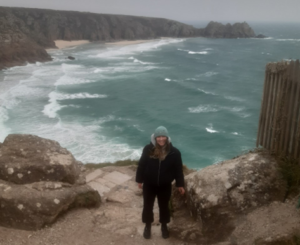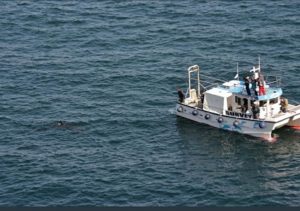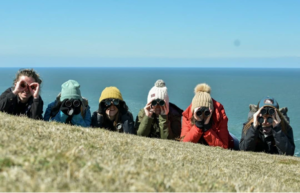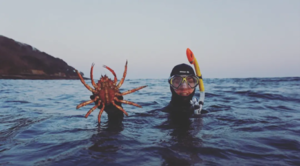We are looking back on some of our MSc graduates who have excelled in marine science around the world since studying with us. Today we meet Rachael Thomson, MSc Marine Vertebrate Ecology & Conservation graduate (2021) and now a Marine Wildlife Analyst for APEM which is an environmental and geospatial ecology company based in the UK.

What did you enjoy most about studying at the University of Exeter?
One of the things I enjoyed the most about studying at the University of Exeter was hearing about the careers and experiences of other scientists who had previously studied here or have some sort of affiliation with Exeter. They do a lot of great research, taking a global collaborative approach which, I think is exciting.
What were the best aspects of studying your course?
Going on the boat trips around Cornwall and spotting basking sharks, seeing Risso’s dolphins and gannets were one of the highlights of studying my course. It was made even better that we were able to share these experiences with lecturers and other key staff in the department, giving us the chance to learn from them. We were also given a great range of research projects to choose from. My research project assessed whether marine turtles nesting in Panama may be somehow buffered from the effects of climate change, as research is suggesting higher temperatures produce more female hatchlings. I really hope to further collaborate with the Sea Turtle Conservancy which is based in Costa Rica and Panama to publish my project.


What skills and experiences did you gain that will/have been useful for job/internship applications?
We were able to learn about the variety of technology that can be used to help solve conservation issues, which was something I found very fascinating and innovative. For example, the use of drones, baited remote underwater video (BRUVS), biologging tags, temperature loggers and aerial survey photography. Learning about these technologies and how to analyse the outputs was a great skill to have in the field of conservation. One bonus of doing my MSc in the pandemic was that it enabled me to spend more time improving my technical skills.
Why did you choose to study at the University of Exeter?
A lot of skills and experiences offered on the Marine Vertebrate Ecology and Conservation MSc seemed practical and useful for the current job market and I really wanted to take advantage of the opportunities. Additionally, I admired a lot of the staff and research that came from the university. Especially their involvement in working with sea turtles, marine mammals, basking sharks, and tuna. There is also a focus on international collaborations, and I enjoy travelling and understanding conservation issues on a global scale.
Do you think there are any factors that make the University of Exeter a unique place to study?
Studying at the Cornwall campus and living in here has been essential to my enjoyment and wellbeing. Choosing where you study is an important part of any undergraduate, postgraduate or PhD decision. Since living here, I have found a new appreciation for UK wildlife and the coastline, with some great opportunities to get out on the water via boat, paddleboard, surfboard or even going for a refreshing cold-water snorkel. I even got the chance to see bioluminescence which I would have never thought was possible in the UK.

What skills and experience have been most useful for your career? And how do you think your programme prepared you for your career/current role?
I think the MSc programmes at Exeter provide excellent networking opportunities and the chance to see what your career could truly look like if you want it enough. Most importantly, the programme encourages independent learning and gives you the confidence to trust your knowledge and skills.
Why did you choose this career?
I have had a natural curiosity for as long as I remember and as soon as I realised science could give me answers, (or answers that lead to more questions), I knew it was for me. As well as collecting anything small and living – from woodlice to limpets. Choosing to pursue conservation began when I volunteered at my first sea turtle project in Kefalonia in Greece where I gained an understanding of the many ways we as humans negatively impact wildlife. After that, I wanted to help be part of the solution.
What advice would you give to a current student who wishes to pursue your career?
Always make time for people and be approachable and friendly, as conservation needs people to work collaboratively. I would say to take advantage of the opportunities you are given and be open to working with different species or in different locations that might put you out of your comfort zone. Lastly, although easier said than done, don’t spend energy obsessing over how well others are doing in the field as you devalue your own achievements, and you deserve to be proud of those.
What are your plans for the future?
I don’t like to plan too much but the most important thing to me is working with passionate people and working towards conservation that aims to solve one or multiple conservation issues. And hopefully improving the conservation of marine vertebrates such as turtles, sharks, marine mammals, and seabirds. If this opportunity doesn’t exist, I will just have to create it!
What advice would you give to anyone thinking of applying to the University of Exeter?
Don’t even hesitate! Reach out to staff at the university or to people like myself who are very accessible on social media platforms like Twitter.

